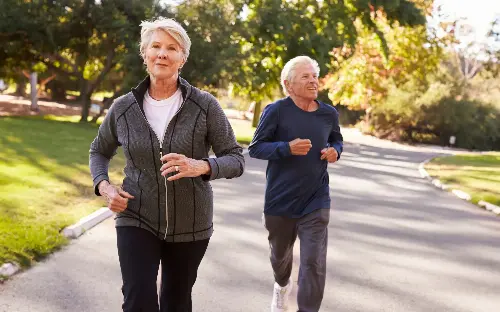
“Weekend warriors” who cram all of their exercise into one or two days each week are less likely to die from cancer, a study suggests.
Participating in at least 150 minutes of moderate to vigorous physical activity in two days had similar health benefits as distributing exercise throughout the week, researchers found.
The study found those who condensed their physical activity into one or two days had a “significantly” lower risk of death from all causes, including heart disease and cancer.
The analysis also found that, for weekend warriors, the risk of death from all causes was 32 per cent lower than inactive people, the risk of death from cardiovascular disease was reduced by 31 per cent and the risk of death from cancer was cut by 21 per cent.
Among participants in the regularly active group, the risk of death from all causes was 26 per cent lower than the inactive cohort the risk of dying from cardiovascular disease was 24 per cent lower; and the chance of death from cancer was reduced by 13 per cent.
The study, published in the Journal of the American Heart Association, examined the physical activity of 93,409 British adults, aged 37 to 73, enrolled in the UK Biobank database.
Data from wristwatch activity trackers captured a range of activities, including walking, jogging, cycling on an exercise bike, household chores, gardening and leisure activities such as dancing.
It found more than 42 per cent of participants were classified as “weekend warriors”, about 24 per cent as regularly active throughout the week, and nearly 34 per cent as “inactive”.
The Chinese research team examined how different physical activity patterns may affect the risk of dying from all causes, specifically cardiovascular disease and cancer.
‘Encouraging news for busy people’
Prof Zhi-Hao Li, from the School of Public Health at Southern Medical University in China, said: “You don’t need to exercise every day to stay healthy.
“As long as you get 150 minutes of moderate to vigorous physical activity per week – whether packed into one to two days or spread out – you can significantly reduce your risk of dying from cardiovascular disease, cancer or other causes.
“This message is encouraging news for busy people who struggle to fit in daily workouts but can manage a concentrated burst of activity on weekends or over a couple of days.
“The research provides reassuring evidence that even sporadic physical activity can have lasting health benefits, making it easier for people to prioritise their well-being amid busy schedules.”
While the new research aligns with previous studies, it is the first to analyse the relationship between physical activity patterns measured by accelerometers and the risk of death from cardiovascular disease and cancer.
The research team did not anticipate that condensed physical activity would reduce the risk of death from disease.
Prof Li said: “This reinforces the idea that meeting the 150-minutes of physical activity per week guideline is key to longevity, regardless of the activity pattern.”
He added: “Any activity – whether structured exercise such as jogging or daily tasks such as gardening – can be included if the intensity is moderate to vigorous.”
Prof Keith Diaz, of Columbia University Medical Centre in New York, said: “Many people struggle to fit in daily exercise during the working week.
“However, this research shows that even if you can only be active on the weekends, you can still gain meaningful health benefits.”
He added: “One important caveat to remember is that trying to fit 150 minutes of exercise into just one or two days can be a lot on your body.
“Some research suggests that ‘weekend warriors’ have a slightly higher risk of musculoskeletal injuries compared to those who exercise more regularly.
“However, the benefits of exercising just on the weekend far outweigh the potential risks.
“If you are going to be a ‘weekend warrior’, make sure you do proper warm-ups and build up and progress to higher volumes of activity over time. This will help to reduce your risk of injuries.”